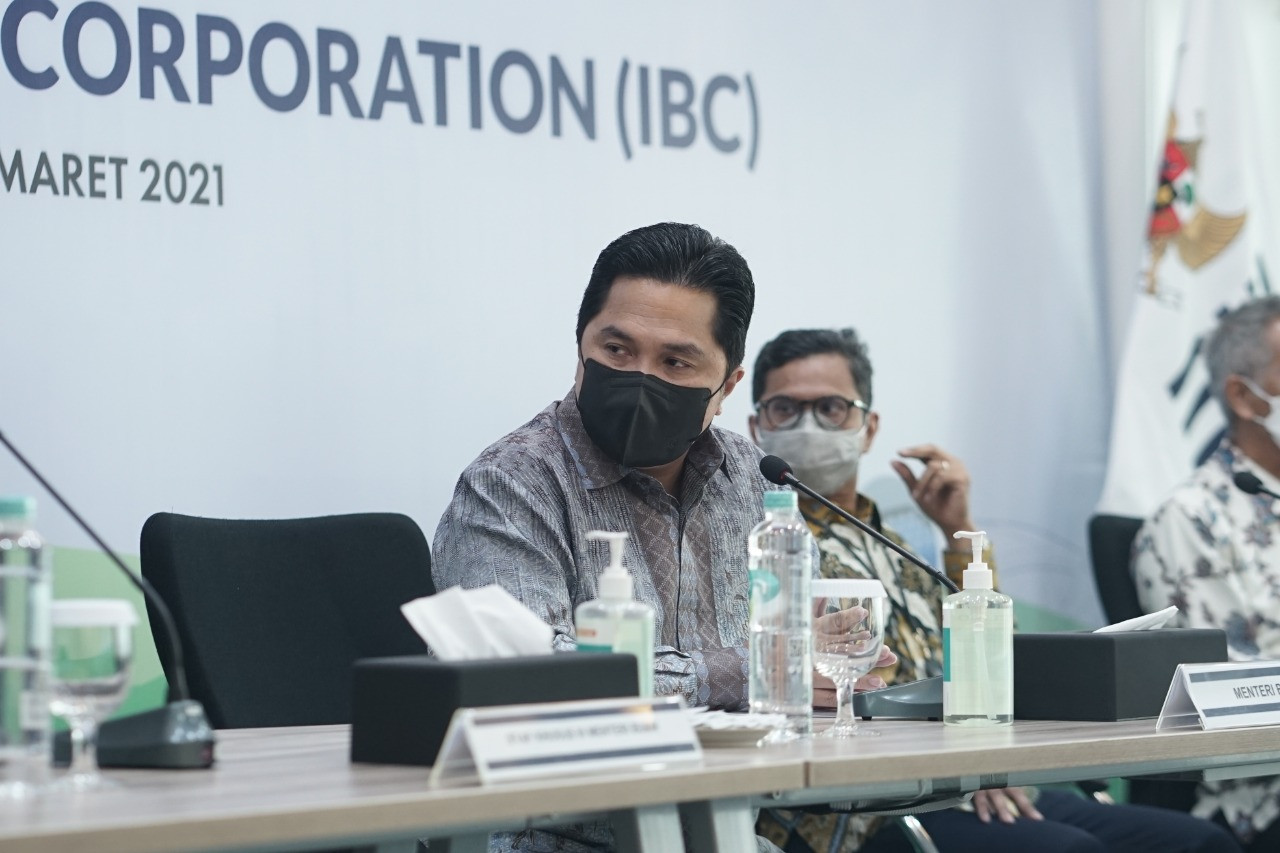SOEs’ financial losses hurt overall economy
Govt lost tax revenue in 2020, injected extra capital to help firms
Change Size

N
et profits at state-owned enterprises (SOEs) plummeted by an estimated 77 percent to Rp 28 trillion in 2020 as the coronavirus pandemic led to mobility restrictions and hit household spending.
SOEs are also estimated to have suffered a drop in revenue of around 25 percent to Rp 1.2 quadrillion (US$84.16 billion) last year, according to an unaudited report from the SOEs Ministry.
SOEs Minister Erick Thohir said SOEs had been forced to significantly slash capital expenditure in response to falling revenue. Had they kept spending as usual, it would have been challenging for some to make a profit, or even to just stay afloat during the pandemic.
“The pandemic had a huge impact on SOEs,” Erick told lawmakers during a meeting at the House of Representatives on June 3.
According to SOEs Ministry data, the energy sector was the hardest hit by the pandemic, with SOEs operating in this sector losing more than Rp 193 trillion in revenue in 2020 compared with the preceding year.
SOEs in infrastructure lost Rp 71 trillion in revenue, making it the second-hardest hit among 13 sectors, followed by tourism with a Rp 55 trillion decline in revenue.
Only four sectors remained profitable for SOEs in 2020, namely health care, insurance and pension, plantation and forestry as well as food and beverages. SOEs operating in those four sectors, in fact, enjoyed an increase in their bottom line compared to 2019.
Read also: Too important to fail
Toto Pranoto, an SOEs analyst from the University of Indonesia, said the drop in SOEs’ performance had a significant effect on the overall economy. According to the government’s strategic plan for SOEs in the 2020-2024 period, SOEs had consistently contributed at least 16 percent to the gross domestic product (GDP) until 2019.
Toto said the economic impact was at least twofold. First, SOEs would cut capital expenditure, which would limit their expansion and investment in several projects. The cut, he said, would impact gross fixed capital formation (GFCF) or investment that contributed more than 30 percent to the GDP.
In 2020, state-owned electricity company (PLN) was forced to cut capex from Rp 100 trillion to Rp 53.59 trillion amid concerns over rising debt. State-owned telecommunications company Telkom also slashed capex, namely from Rp 36.59 trillion in 2019 to Rp 29.4 trillion in 2020, to retain profitability.
Second, SOEs have been forced to lay off staff and delay salary payments. This has had an effect on household spending, which accounts for more than half of Indonesia’s GDP. Recently, state-controlled airline Garuda Indonesia announced that it had postponed $23 million worth of salary payments in 2020.
“COVID-19 has effectively destroyed business. SOEs are no exception,” Toto told The Jakarta Post on Tuesday, adding that any hope for business activity returning to normal soon depended on progress in the vaccination effort.
Institute for Development of Economics and Finance (Indef) executive director Tauhid Ahmad noted that the state budget would also suffer, because SOEs were a major source of state revenue, mainly in the form of dividends and taxes.
According to SOEs Ministry data, the COVID-19 crisis caused tax revenue from SOEs to drop 17 percent to Rp 236 trillion in 2020, the lowest level since 2017. Dividends received by the state from SOEs, meanwhile, fell 12 percent to Rp 44 trillion.
“State revenue is obviously affected by SOEs’ performance decline,” Tauhid told the Post on Tuesday.
At the same time, the government was forced to help troubled SOEs get back on their feet with state capital injections (PMN). SOEs Ministry data show that, for the first time in five years, the state spent more on PMN than it received from SOEs in dividends, meaning the government lost rather than earned money on its enterprises in 2020.
In 2021, dividends are projected to amount to Rp 28 trillion, while PMN are expected to hit Rp 67 trillion. Little improvement is expected for 2022 with projected dividends of just Rp 35 trillion against PMN expenditure of Rp 62 trillion.
Read also: Indonesia plans to inject $2.5b into SOEs next year to stimulate economy, resolve Jiwasraya scandal
Tauhid said PMN should be given with scrutiny, as the government should also consider its budget deficit. SOEs could receive the capital injections only if they needed to be saved and were affected by COVID-19.
“Should the government not be careful, the PMN will make up for losses and patch up cash flow, but there will be no improvement and the money will just go to waste,” Tauhid said.









